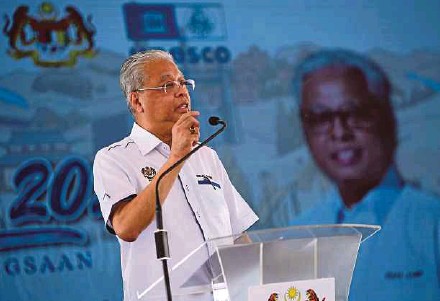THE huge volume of groundwater resources should be tapped to serve as an alternative source of water for the country, said Prime Minister Datuk Seri Ismail Sabri Yaakob yesterday. The Bera member of parliament said Malaysia used only less than three per cent of its groundwater.
“Malaysia uses less groundwater than Denmark, which uses 100 per cent of its groundwater. Austria uses 98 per cent, Thailand uses up to 80 per cent, China 78 per cent, and the United States about 50 per cent.
“In Malaysia, groundwater is used as a source of drinking water in Kelantan, Terengganu, Pahang, Perlis, Kedah, Sabah and Sarawak.
“Malaysia is estimated to have about 5,000 billion cubic metres of underground water with the capability to process about 64 billion cubic metres a year.
“The groundwater reserve is huge and can serve as an alternative source for the country,” he said at the launch of World Water Day 2022 here yesterday. Ismail Sabri said the National Water Resources Study for Peninsular Malaysia (2000-2050) had proposed to build more water catchment areas or reservoirs to meet the needs and demand for domestic water supply and irrigation until 2050.
“The study found that groundwater can be used as an alternative source for rural and remote areas catering to industrial, agriculture and domestic use through several appropriate methods and processes.
“The Energy and Natural Resources Ministry, through the Mineral and Geoscience Department, has begun efforts such as mapping, developing, monitoring and establishing a Groundwater Data Centre and Inventory.
“This is to boost the use of groundwater as a conjunctive source of national water supply during the construction of underground dams, artificial aquifers (managed aquifer recharge) and riverbank filtration.
“Continued measures will be carried out to strengthen and harmonise governance related to groundwater resources with all the stakeholders at both the federal and state levels.”
He said stakeholders must pay attention and take action to preserve water resources, especially groundwater, to ensure water availability.
Ismail Sabri said the government was studying the National Water Resources Policy by taking into account the current situation and challenges faced by the country’s water sector.
“The policy will cater to the Water Sector Transformation 2040 and other development plans under the 12th Malaysia Plan.
“The policy emphasises the need to protect the environment to conserve water resources, namely both surface water and groundwater.”
He stressed that despite the country having sufficient water resources to provide safe and treated water, the people had to be aware that there were still issues and challenges related to water resources management that must be addressed.
"First, there is sometimes an excessive quantity of water during the rainy season and an insufficient amount during the dry season. Secondly, the deteriorating water quality and unbalanced distribution.
“The issues and challenges in managing national water resources have to be addressed effectively to achieve sustainable and holistic management of them.
“Uninterrupted availability and sustainability of clean water resources will further ensure the wellbeing of the people.” Ismail Sabri said to tackle the floods in Bera, the Irrigation and Drainage Department was implementing an environmentally friendly drainage master plan for the town.
“It will serve as a guide and reference to plan future developments, especially in ensuring a more systematic and sustainable drainage system. Once completed, the project will benefit some 100,000 villagers in Bera and reduce the risk of floods,” he said.
Present at the programme with the theme “Conserving Water Resources (Utilising Groundwater)” was Environment and Water Minister Datuk Seri Tuan Ibrahim Tuan Man.



